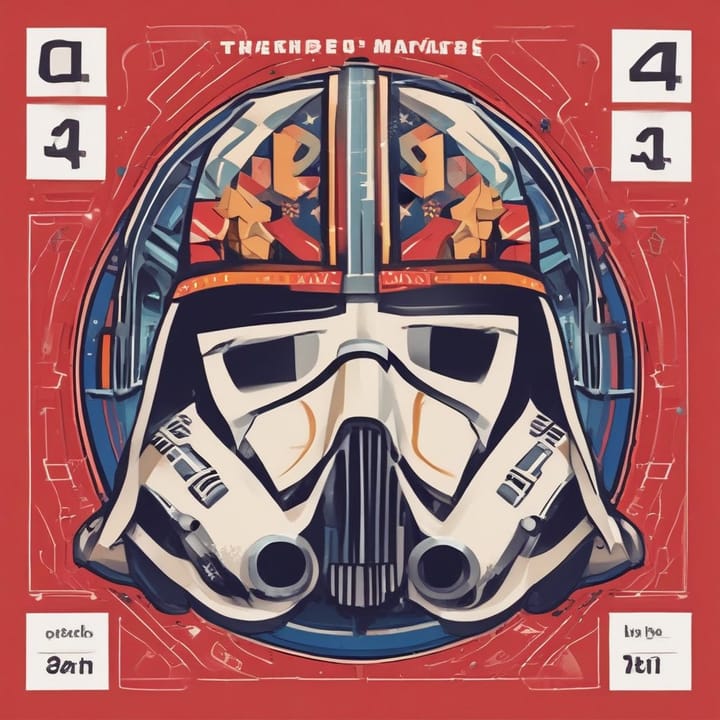The Influence of Religion in Dune: Exploring the Role of Faith in Frank Herbert's Universe
Exploring the impact and significance of religious themes in the Dune universe

Frank Herbert's Dune is a richly detailed and complex universe, filled with diverse cultures, political intrigue, and deep religious traditions. This article delves into the role of religions in Dune, uncovering the ways in which faith influences the characters, societies, and power dynamics in this iconic science fiction series.
The Formative Role of Religion in Dune's Societies
In the vast and complex universe of Frank Herbert's "Dune," religion plays a pivotal role in shaping the values, norms, and behaviors of the various societies and characters that inhabit it. This chapter will delve into the formative role of religion in Dune, exploring the different faiths that exist within the series and the ways in which they foster a sense of belonging, identity, and purpose. The Bene Gesserit, an all-female order of political and religious leaders, have a particularly influential role in shaping the religious landscape of Dune. Through their Missionaria Protectiva, the Bene Gesserit have seeded numerous planets with their own brand of religion, designed to protect and serve their interests. The Missionaria Protectiva instructs Bene Gesserit sisters to infiltrate primitive cultures and establish a belief system that includes a mythic figure known as the "Missionaria Protectiva." This figure is said to arrive in times of crisis to save the people and lead them to a better future. By doing so, the Bene Gesserit create a safety net for their own kind, ensuring that they will be protected and revered wherever they go. Another important religious group in Dune is the Spacing Guild, who have their own unique set of beliefs and practices. The Spacing Guild's Navigators are responsible for guiding spacecraft through the vastness of space, and they do so by using a form of prescient awareness that is powered by a rare and addictive spice known as melange. The Navigators' abilities are seen as almost supernatural, and they are revered and feared in equal measure. The Guild's reliance on melange has also led to the development of a unique religious belief system, centered around the worship of the spice and the Navigators' abilities. In addition to the Bene Gesserit and the Spacing Guild, the Fremen of the planet Arrakis also have a deeply ingrained set of religious beliefs and practices. The Fremen are a desert-dwelling people who have a profound reverence for water, which is a scarce resource on their planet. They believe that water is the source of all life, and they go to great lengths to conserve and protect it. The
Religion as a Tool for Control and Manipulation in Dune
In the world of Frank Herbert's Dune, religion serves not only as a source of spiritual solace and communal identity but also as a potent tool for control and manipulation. The intricate web of religious beliefs and practices that pervades the series is frequently wielded by various factions to further their own interests, often at the expense of the faithful. This chapter will examine the ways in which the Bene Gesserit, the Emperor, and the Fremen employ religion as a means of control, exploring the motivations and consequences of these actions and considering the ethical implications of using faith as a means to an end. The Bene Gesserit, an all-female order of mystics, politicians, and breeders, have long recognized the potential of religion as a tool for manipulation. Through their Missionaria Protectiva, the Bene Gesserit have seeded numerous worlds with carefully crafted religious beliefs and practices, designed to ensure the survival of their sisters and further their eugenic breeding program. By subtly shaping the religious landscape of entire planets, the Bene Gesserit are able to exert a profound influence over the thoughts, actions, and destinies of countless individuals. One of the most striking examples of the Bene Gesserit's manipulation of religion can be found in their handling of the Lisan al-Gaib, or "the Voice from the Outer World," mythos. This ancient prophecy, which foretells the arrival of a messianic figure who will lead the Fremen people to freedom and prosperity, is expertly woven into the Bene Gesserit's breeding plans. By carefully arranging for the birth of a male heir with the necessary genetic traits, the Bene Gesserit hope to create a figurehead around whom the Fremen can rally, thereby securing their own position within the power structure of the Dune universe. The consequences of this manipulation are far-reaching and profound. On one hand, the Bene Gesserit's machinations ultimately result in the birth of Paul Atreides, the Kwisatz Haderach, who indeed becomes a powerful religious and political force among the Fremen. On the other hand, the Bene Gesserit's heavy-handed
The Intersection of Religion and Politics in Dune
In the complex and intricate world of Frank Herbert's Dune, religion and politics are inextricably intertwined, shaping the balance of power, diplomacy, and conflict in this vast universe. The intersection of these two realms creates a unique dynamic, where faith-based institutions and ideologies significantly influence the political landscape. This chapter delves into this intricate relationship, exploring the roles of religious leaders, such as the Emperor and the Reverend Mother Gaius Helen Mohiam, in the power struggles and maneuverings that define the Dune universe. To begin with, it is essential to understand that religion in Dune serves as a unifying force, bringing together diverse populations under a shared set of beliefs and practices. At the same time, it is also a tool for control and manipulation, as highlighted in the previous chapter. This dual nature of religion allows it to play a significant role in the political arena, where alliances are forged, and enmities are cultivated based on religious affiliations. One of the most powerful religious figures in the Dune universe is the Emperor, who wields both political and spiritual authority. The Emperor is considered the spiritual head of the Church of the Divided God, a faith that venerates the mythical figure of the Kwisatz Haderach. This dual role allows the Emperor to exercise significant influence over the Great Houses, using religious doctrine to legitimize his rule and maintain order in the Imperium. However, the Emperor's manipulation of religion is not without consequences. By positioning himself as the ultimate authority on matters of faith, the Emperor invites challenges from those who seek to undermine his power. This is evident in the case of Paul Atreides, the protagonist of Dune, who is revealed to be the Kwisatz Haderach, a prophesied figure in the Church of the Divided God. Paul's emergence as the ultimate religious and political leader threatens the Emperor's authority, setting the stage for a confrontation that will shape the future of the Dune universe. Another critical religious figure in Dune is the Reverend Mother Gaius Helen Mohiam, a member of the Bene Gesserit, a secretive sisterhood that wields significant political and spiritual power. The Bene Gesserit
The Evolution and Transformation of Religion in Dune
In the Dune universe, religion is a complex and ever-evolving force that shapes the beliefs, values, and actions of its inhabitants. Throughout the series, religious beliefs and practices adapt and transform in response to changing circumstances and new revelations, reflecting the dynamic and interconnected nature of the Dune universe. This chapter will explore the evolution of religion in Dune, considering the significance of this evolution and its potential implications for the future of the Dune universe and its inhabitants. At the heart of the Dune series is the transformation of the Fremen, a nomadic people living in the harsh desert environment of Arrakis, into a powerful and influential force in the universe. This transformation is driven in large part by the evolution of their religious beliefs and practices. Initially, the Fremen follow a syncretic religion that combines elements of Islam, Christianity, and Judaism, among others. However, as they come into contact with new ideas and experiences, their religious beliefs and practices evolve and adapt. One of the key factors driving this evolution is the discovery of the messianic figure, Paul Atreides. Paul, who is also known as Muad'Dib, is the son of the Duke Leto Atreides and the Bene Gesserit Lady Jessica. He is born with unique abilities, including prescience, and is seen by the Fremen as a religious and political leader who will lead them to victory over their oppressors. As Paul's following grows, the Fremen religion evolves to incorporate his teachings and message. The Fremen religion also evolves in response to new revelations about the nature of the universe and the role of humanity within it. For example, the discovery of the spice melange, a powerful and addictive substance that grants extended life and heightened awareness, leads to the development of new religious practices and beliefs centered around its use. Similarly, the revelation that humans are not the only intelligent life form in the universe, but are instead one of many interconnected and interdependent species, leads to the development of a new, more inclusive and holistic religious worldview. The evolution of the Fremen religion has significant implications for the future of the Dune universe and its inhabitants. For one, it enables the Fremen to unite and organize themselves into a powerful and cohesive force, capable of challenging the dominant political and economic structures of the universe. Additionally, the Fremen religion provides a framework for understanding and navigating the complex and interconnected nature of the universe, enabling its followers to make sense of their place within it and to act in ways that are aligned with their values and beliefs. However, the evolution of the Fremen religion also has its drawbacks. For one, it can lead to the suppression of alternative viewpoints and the marginalization of those who do not conform to the dominant religious ideology. Additionally, the focus on a single, messianic figure can lead to the concentration of power in the hands of a few, potentially leading to the abuse of that power and the exploitation of those who are seen as inferior or less deserving. The evolution of religion in Dune is not limited to the Fremen. Other religious groups, such as the Bene Gesserit and the Spacing Guild, also undergo significant transformations in response to changing circumstances and new revelations. For example, the Bene Gesserit, a secretive and powerful sisterhood of women, evolves from a purely secular organization focused on genetic engineering and political manipulation, to a more spiritually-oriented group that seeks to understand and harness the power of the universe for the betterment of humanity. Similarly, the Spacing Guild, a powerful and influential organization responsible for interstellar travel, evolves from a purely technocratic and materialistic worldview, to one that incorporates elements of mysticism and spirituality. This evolution is driven in part by the discovery of the Navigator's ability to fold space, which is seen as a quasi-mystical experience that transcends the limits of conventional science and technology. The evolution of religion in Dune reflects the complex and interconnected nature of the universe, in which beliefs, values, and actions are shaped by a wide range of factors, including culture, history, politics, and technology. It also highlights the importance of adaptability and flexibility in the face of changing circumstances, as well as the need to balance the desire for certainty and stability with the recognition of the inherent uncertainty and complexity of the universe. In conclusion, the evolution and transformation of religion in Dune is a complex and multifaceted process that reflects the dynamic and interconnected nature of the Dune universe. The evolution of religious beliefs and practices
Conclusions
Frank Herbert's Dune presents a fascinating and multifaceted exploration of the role of religions in shaping societies, driving power dynamics, and influencing individual beliefs and behaviors. By examining the complex interplay between faith and politics, control and manipulation, and adaptation and transformation, this article offers a deeper understanding of the intricate tapestry of the Dune universe and the enduring power of religious traditions.


